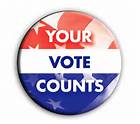
Although some will move from shutdown villains to Congressional royalty, there is more than control of Congress at stake when US voters go to the polls today. Americans will vote in 36 gubernatorial races, they will elect thousands of state officials and have their say in about 140 statewide referendums. Voters who sit out some elections, but vote today could be playing a vital role by helping to keep our democracy on track.
Florida will vote on legalizing marijuana for medical reasons. Oregon and Alaska will vote on legalizing pot for recreational use and in Washington, DC, the polls indicate a big majority will vote to legalize marijuana for recreational use, though sale, regulation and taxation are off the table because the city does not fully control its own finances.
Arkansas and South Dakota will vote on a referendum to increase the state minimum wage to $US8.50 ($9.75) an hour. Nebraska's referendum would increase the minimum wage to $US9 and Alaska would go further, to $US9.75 an hour. Locally, San Francisco will vote on a minimum wage of $US15, while nearby Oakland will consider a $US12.25 minimum wage. Each referendum is expected to pass, many quite easily.
Alabama, Missouri and Washington will vote to enshrine gun ownership as a right in their state constitutions. Washington will also vote on a competing measure to require background checks for gun purchases.
Tennessee, Colorado and North Dakota will vote on measures that would greatly restrict abortion rights.
Alabama and Mississippi will vote on whether to enshrine the right to hunt in the state constitutions.
Oregon will vote on whether or not to grant driver's licenses to people who cannot prove legal residence in the United States.
Most recently conservative states have voted to create voter ID laws, which many believe are intended to keep minorities and the poor from voting. Illinois will vote on the Right to Vote Amendment to the state constitution, which would forbid any voting discrimination on the basis of race, ethnicity, religion, sexual orientation, language or income. Many regard the measure as an attempt to prevent enactment of a voter ID law.
These are the first elections since the Supreme Court did away with federal oversight of electoral changes in areas of racial discrimination, and permitted laws increasing requirements for voter identification to limit fraud.
Follow the latest news and information: Dose of News www.doseofnews.com. Click: Politics